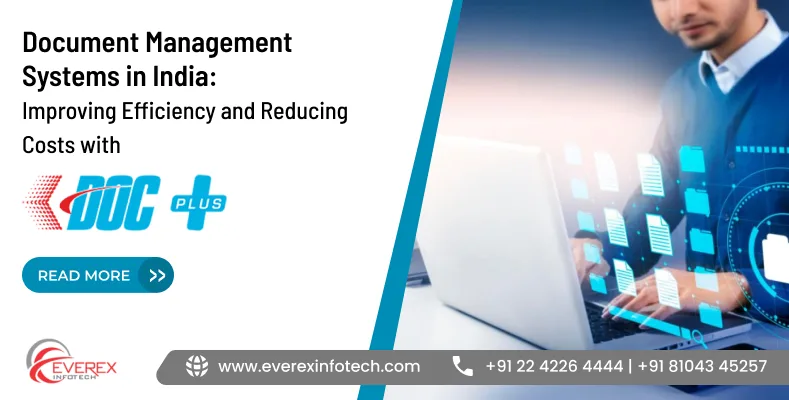A Document Management System (DMS) offers a streamlined approach to storing, organizing, and accessing digital documents, which plays a vital role in boosting operational efficiency while cutting down costs. With India’s rapid digital transformation and data-centric operations, a DMS is no longer a luxury—it’s a necessity. This blog explores how a DMS can improve efficiency and reduce costs, as well as its growing relevance in the Indian market.
What is a Document Management System?
A Document Management System (DMS) is a software solution that helps businesses manage, store, retrieve, and track electronic documents in a secure, centralized repository. In addition to storing files, a DMS often includes features like document indexing, search functionality, version control, and access permissions, making it easier for teams to collaborate, share, and secure information.
Key Benefits of DMS for Indian Businesses
Indian businesses, from small enterprises to large corporations, can benefit significantly from implementing a DMS. Here are some key ways in which a DMS can boost efficiency and reduce operational costs:
- Enhanced Document Accessibility
- A DMS enables quick and easy access to documents, even from remote locations. In a large, diverse country like India, where companies often operate across multiple regions, having instant access to files from anywhere is crucial. Employees no longer need to search through physical files or request documents from another branch, saving time and improving productivity.
- Reduced Physical Storage Costs
- Physical file storage requires space, furniture, and facilities management, all of which incur costs. A DMS digitizes documents, eliminating the need for physical storage and allowing companies to repurpose office space for other business functions. This can be particularly advantageous for companies in urban centers where real estate costs are high.
- Improved Data Security and Compliance
- With increasing regulatory requirements in India (such as GDPR for data protection and industry-specific guidelines), a DMS ensures that sensitive information is stored securely and access is restricted. A robust DMS also enables tracking and auditing document usage, helping businesses stay compliant and reduce the risk of data breaches, which can lead to costly penalties.
- Streamlined Workflow and Collaboration
- A DMS allows multiple users to access, edit, and comment on a single document in real-time. This facilitates faster decision-making and smoother collaboration across teams. In industries where document approval workflows are necessary (such as finance, healthcare, and manufacturing), a DMS can automate and expedite these processes, ensuring that projects move forward without unnecessary delays.
- Reduced Operational and Printing Costs
- Digitizing documents and workflows reduces the need for printing, copying, and distributing paper documents, directly lowering costs associated with paper, ink, and maintenance of printers. Additionally, document retrieval is automated, saving employees time and enabling them to focus on higher-value tasks.
- Enhanced Disaster Recovery Capabilities
- Traditional paper records are susceptible to loss due to fire, flood, or other disasters. A DMS provides backup and recovery features, ensuring that documents are safe and can be restored in case of an emergency. For Indian businesses, where unforeseen events can disrupt operations, having a secure, cloud-based document storage system offers a significant advantage.
The Growing Demand for Document Management Systems in India
India’s expanding digital economy, along with government initiatives like Digital India, is driving the adoption of DMS in the country. Businesses are realizing the need for efficient data management, especially as the volume of digital information continues to grow exponentially. In sectors such as banking, healthcare, education, and government, a DMS provides significant operational and compliance advantages.
Small and medium-sized enterprises (SMEs) are also investing in DMS solutions to enhance operational efficiency. Many DMS providers now offer cloud-based, subscription options, making these systems more affordable and accessible to Indian SMEs.
Real-World Impact: How DMS Helps Indian Businesses Succeed
Many Indian companies have reported transformative results after implementing a DMS. From reducing document processing time by half to cutting administrative expenses by over 30%, the benefits are clear. For example, a DMS can reduce time spent on document retrieval by 80%, enabling employees to focus more on revenue-generating activities rather than administrative tasks.
Conclusion
As India’s digital landscape continues to evolve, the adoption of a Document Management System offers clear benefits for businesses aiming to enhance efficiency and reduce costs. A well-implemented DMS not only simplifies document handling but also provides a competitive edge in today’s fast-paced market. By investing in a DMS, Indian companies can streamline their operations, improve security, and set themselves up for long-term growth and success in the digital age.
With these insights, it’s evident that a Document Management System is more than a tool—it’s a strategic asset for any forward-thinking Indian business looking to thrive in a digital-first world.



Comments are closed